
Transportation in the Swing Era
ALL ABOARD!!
America by Air in the Swing Era

Airplanes and Air Travel were the zeitgeist of the Swing Era -- everything had to be fast, shiny and streamlined. Since air travel was largely reserved for wealthy risk-takers, it had a certain elan that filtered down into society. This sense was helped along by eager artists whose conceptions confused the airplane with the ocean liner (left) or displayed an appalling ignorance of elementary physics (right).


Oulandish Artist's "Conceptions"
From Popular Mechanics
(left) April, 1934 (right) March, 1932
Click to Enlarge
Lindbergh's achievements represented a new era in American history. All of this is summarized in the medallionof the 1929 Railway Express Building in Baltimore (located next to the railroad station.) Note the mixed symbolism of air, wheels and wings, all wrapped up with a Federal shield. This was a building to inspire faith in the Future.

Medallion of the Railway Express Station
St. Paul Street, Baltimore Maryland
Now used as private loft residences
Click to Enlarge
Our treatment of aircraft began as an account of my trials and tribulations in building a 1948 airplane model kit. Since then, we have developed a wealth of patent diagrams for historic aircraft. On November 25, 2009 we built this page to integrate all the smaller pages in a format that will load quickly. We split the material into six segments, corresponding to the six boxes or "buttons" below. If you came in from a search engine looking for something very specific, click here for the Analytical Index that will enable you to find a specific topic.
However, if you are not interested in patents, KEEP ON SCROLLING to look at some general articles on Aviation in the 1930s --- or
- Click here to look at Trans-Atlantic Aviation
- Click here to look at Trans-Pacific Aviation
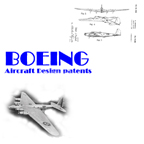

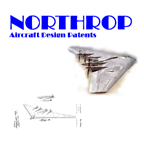
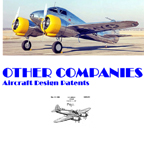
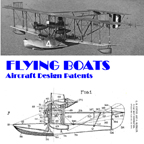
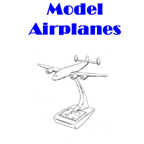
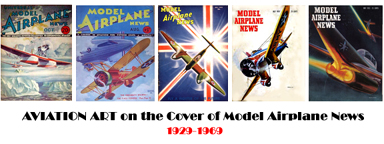
Click to look at all the covers of Model Airplane News from 1929-1969.
For those of you who don't like buttons, go to the analytical index to find just what you're looking for.
Mythology and Reality of Aviation in the 1930s
We were fortunate to obtain a large number of issues of Popular Mechanics during the period 1932-1939, the key points in the evolution of Trans-Atlantic and Trans-Pacific aviation.
Part One: Trans-Atlantic Aviation
This graphic show transatlantic aviation at the beginning of the 1930s:
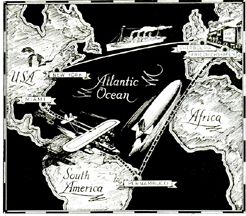
Three Modes of Travel to Europe
Clipper to Brazil, Zeppelin to Europe, Steamship Home
From Popular Mechanics September, 1934
Click to Enlarge
As the 1930s began, aircraft simply did not have the endurance to brave the tricky weather and distances across the Atlantic. Lindbergh had shown that it was "possible" -- but a lone airman's highly risky flight did not add up to scheduled air service. Most heavier-than-air aircraft were flying boats. By 1934, commercial air transportation had begun between the US and the islands of the Caribbean. It was possible to fly from Miami to Rio De Janero in the Sikorsky flying boats made famous in the film Flying Down to Rio. At the same time, German zeppelins were plying a profitable trade transporting passengers from Rio to Dakar (the closest point between the Eastern and Western hemispheres) and thence to Europe. The stormy Atlantic was as yet impassible, so travelers returned on luxury steamships.
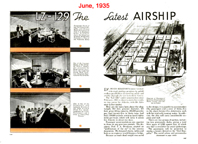
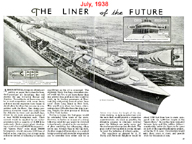
Dirgibles and Steamships
(left)Luxury Accommodations on the Hindenburg (June, 1935)
(right) Steamship developments in the 1930s (July, 1938)
Click to Enlarge
Our review has turned up a number of informative articles that will give you an in-depth understanding of the evolution of transatlantic air travel
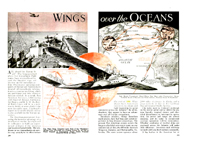


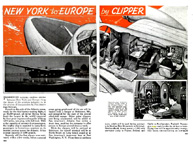
A Look at Technical details of Transatlantic Travel
(left to right)Wings Over the Atlantic (March, 1934)
Wings Over the Spanish Main (November, 1935) Diesel in the Air (August, 1938)
New York to Europe by Clipper
Click to Enlarge
Here are some articles that deal with luxury aboard some of the long-distance planes of the 1930s.

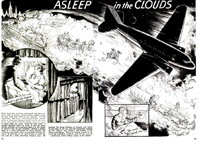

Luxurious Accommodations on Long Distance Planes
(left) Collection of Unusual Transatlantic Forecasts
(middle) Asleep in the Clouds
(right) Pullman of the Air
Click to Enlarge
Here are some wonderful color sections dealing with long distance travel


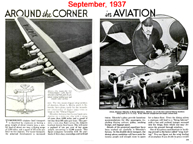

Special Color Inserts in Popular Mechanics
(left to right) Around the World by Air (Part 1)
Around the World by Air (Part 2)
Around the Corner in Aviation
(right) Giant New Airliners
Click to Enlarge
For your reading pleasure, we have created ".pdf" files for these interesting articles. They contain a lot of photographs that are not often seen.
- Click Here to download "Luxury Accommodations on the Hindenburg"
- Click Here to download "Mid 1930s Developments in Steamships"
- Click Here to download "US to Europe By Air "
- Click Here to download "Wrong Way Corigan"
- Click Here to download "Wings Over the Atlantic"
- Click Here to download "Wings Over the Spanish Main"
- Click Here to download "Diesel in the Air"
- Click Here to download "New York to Europe by Clipper"
- Click Here to download "Collection of Unusual Transatlantic Forecasts"
- Click Here to download "Asleep in the Clouds"
- Click Here to download "Around the World by Air (Part 1)"
- Click Here to download "Around the World by Air (Part 2)"
- Click Here to download "Around the Corner in Aviation"
- Click Here to download "Giant New Airliners"
Part Two: Trans-Pacific Aviation
This graphic show Trans-Pacific aviation during the "Golden Age of Flying Boats":
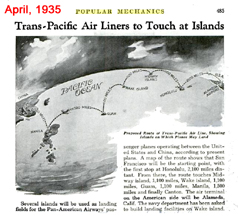
Island Hopping
Note the island stops...
... soon to become major WWII Battlegrounds
From Popular Mechanics April, 1935
Click to Enlarge
Distances in the Pacific are vast. Given the limited range of flying boats of the 1930s, it is fortunate that there were a number of island stops where planes could refuel and take refuge from hostile weather. The US was not the only country to recognize the value of strategically placed islands. Honolulu, Midway, Wake, Guam, and Luzon were all envied by the Japanese and were part of their plan of conquest. It cost many, many thousands of American lives to reclaim these islands.
Our review has turned up a number of informative articles that will give you an in-depth understanding of the evolution of Trans-Pacific air travel
Here are two articles that lay out the general structure of Trans-Pacific aviation and the very important role of weather forecasting. To give you some additional background on covering long distances with aircraft, we have also included a look at building a Trans_Canada airline.
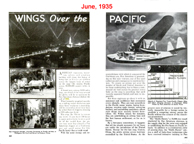

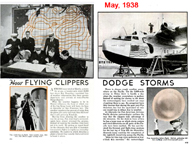
Fundamentals of Trans-Pacific Aviation
(left) Wings Over the Pacific (June, 1935)
(Middle) Trans-Canada Airline (May, 1937)
(right) How Flying Clippers Dodge Storms (May, 1938)
Click to Enlarge
The vast distances meant that planes had to be designed to carry a fairly large number of revenue passengers. The Pacific flying boats were called "Clippers" after the graceful old sailing ships of the tea trade. They were among the very largest airplanes and captured the attention of the public.

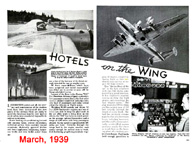

Size Mattered
(left)New Giants for the Airlines (February, 1938)
(middle) Hotels on the Wing (March, 1939)
(right) Future Titans of the Skies (December, 1936)
Click to Enlarge
Our review turned up two articles about how new pilots were trained to meet the demands of Trans-Pacific aviation.
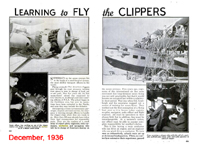
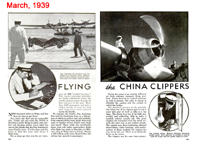
Flight Training
(left) Learning to Fly the Clippers (December, 1936)
(right) Flying the China Clippers (March, 1939)
Click to Enlarge
There was a fascination with Test Pilots -- brave young men who took unprecedented risks. These fellow were romanticized in films from Test Pilot (Clark Gable and Myrna Loy) to The Right Stuff. Eventually, the Test Pilot gave way to the Astronaut as a folk hero.
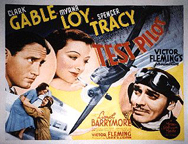

Romanticizing the Test Pilot
Click to Enlarge
Here are several articles from the 1930s about test Pilots.
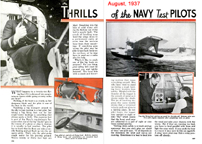
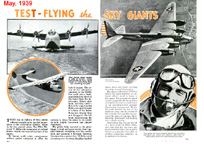
Test Pilots
(left) Thrills of the Navy Test Pilots (August 1937)
(right) Test Flying the Sky Giants (May, 1939)
Click to Enlarge
For your reading pleasure, we have created ".pdf" files for these interesting articles. They contain a lot of photographs that are not often seen.
- Click Here to download "Wings Over the Pacific"
- Click Here to download "Building a Trans-Canada Airline"
- Click Here to download "How Clippers Dodge Storms"
- Click Here to download "New Giants for the Airlines"
- Click Here to download "Hotels on the Wing"
- Click Here to download "Future Titans of the Skies"
- Click Here to download "Learning to Fly the Clippers"
- Click Here to download "Flying the China Clippers"
- Click Here to download "Thrills of the Navy Test Pilots"
- Click Here to download "Test Flying the Sky Giants"
Counter for the ENTIRE WEBSITE
Home | About Lindy | 1940s Collectibles | Upcoming Events | Vintage Clothing
The Guide - Establishments - Travel - Accessories
Music | Links | Photo Gallery | Extras | Contact